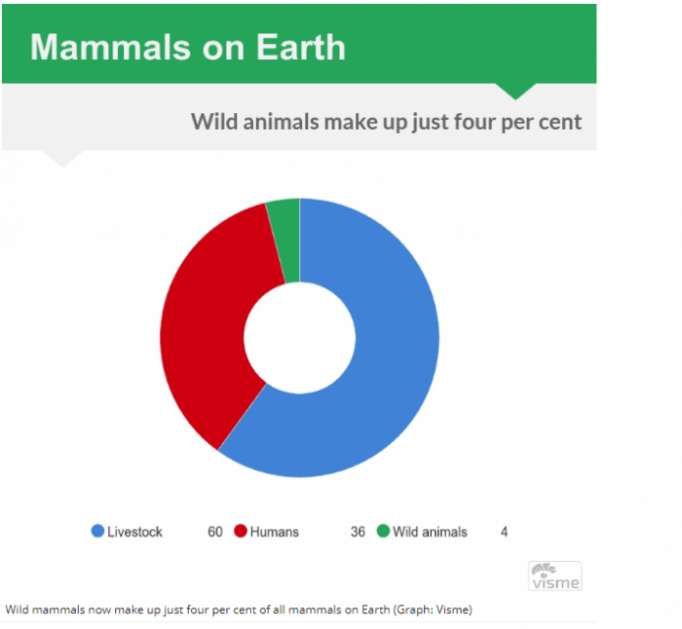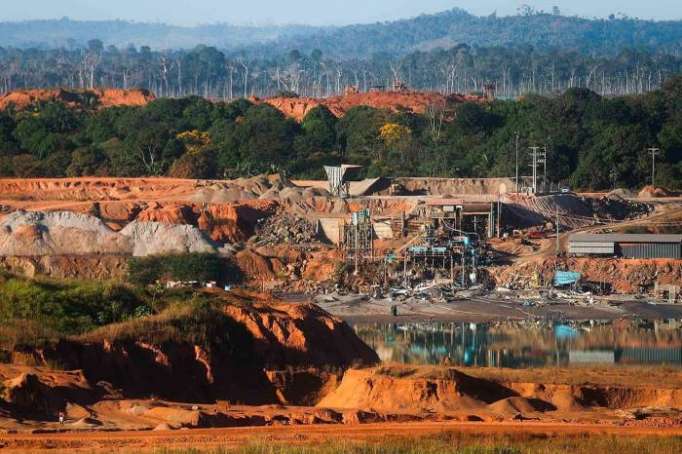The world’s 7.6 billion humans account for just 0.01 per cent of Earth’s living biomass. Yet since the dawn of civilisation, humans have been responsible for wiping out 83 per cent of all of Earth’s mammals, and half of its plants.
Livestock and poultry far outweigh wild animals
Meanwhile, 60 per cent of living mammals are now livestock, 36 per cent are humans, and just four per cent are wild animals. And of all the world’s birds, 70 per cent are farmed poultry.
The study, published in the Proceedings of the National Academy of Sciences, is the first comprehensive estimate of the weight of every class of living creature.
Plants and bacteria dominate the Earth’s biomass
It found the overwhelming majority of Earth’s living matter is made up of plant life – 82 per cent. Bacteria accounts for 13 per cent, with all other living creatures – including animals, fish, insects and funghi – make up just five per cent.

The study found marine life accounts for just one per cent of all living matter, despite water making up 71 per cent of the Earth’s surface.
By biomass there are:
Three times more viruses than humans
Three times more worms
12 times more fish
17 times more insects, spiders and crustaceans
200 times more funghi
1,200 times more bacteria
7,500 times more plants
Professor Ron Milo, one of the authors of the study, told i: “There were several numbers which surprised us. We, as well as many scientists we talked to, were surprised by the higher biomass of plants relative to that of bacteria, and by the fact biomass on land is much higher than that in the oceans. “We were also surprised that there is more consumer biomass than producer biomass in the marine environment, which is counter intuitive. “Finally, we were struck by the fact that there is more domesticated chicken biomass than all the biomass of wild birds.”
The Anthropocene
Human domination of the planet has led scientists close to declaring a new geological era called the Anthropocene.
Experts say this new epoch should begin around 1950, and be defined by nuclear testing, plastic pollution and domesticated chicken.
It would take over from the Holocene, which begun approximately 11,650 years ago, and is considered by some to be an interglacial period. The Anthropocene would be the first ever epoch defined by humanity’s impact on the planet.
Humans causing mass extinction
About half of Earth’s animal life has been lost in the last 50 years, in what some scientists are calling the sixth mass extinction of life on Earth.
Much of this extinction has been down to humans, with pollution and deforestation playing a huge part in the destruction of wild animals’ habitats.
Since humans started farming, only a sixth of wild mammals remain on land, and a fifth of sea mammals.
Professor Milo said: “I think it is significant to see that human impact is visible at the global scale, because it shows that our activities affect the globe significantly.
“I think this raises the issue of the limited resources that our planet has to supply and suggests that on some measures we are getting close to some of those limits, such as potential arable land.”
The researchers for the study used data from hundreds of previous studies to calculate their biomass estimates.
They used techniques such as satellite remote sensing – which is good for scanning large areas – and gene sequencing, which can differentiate between different microscopic organisms.
More about: #Earth
















































